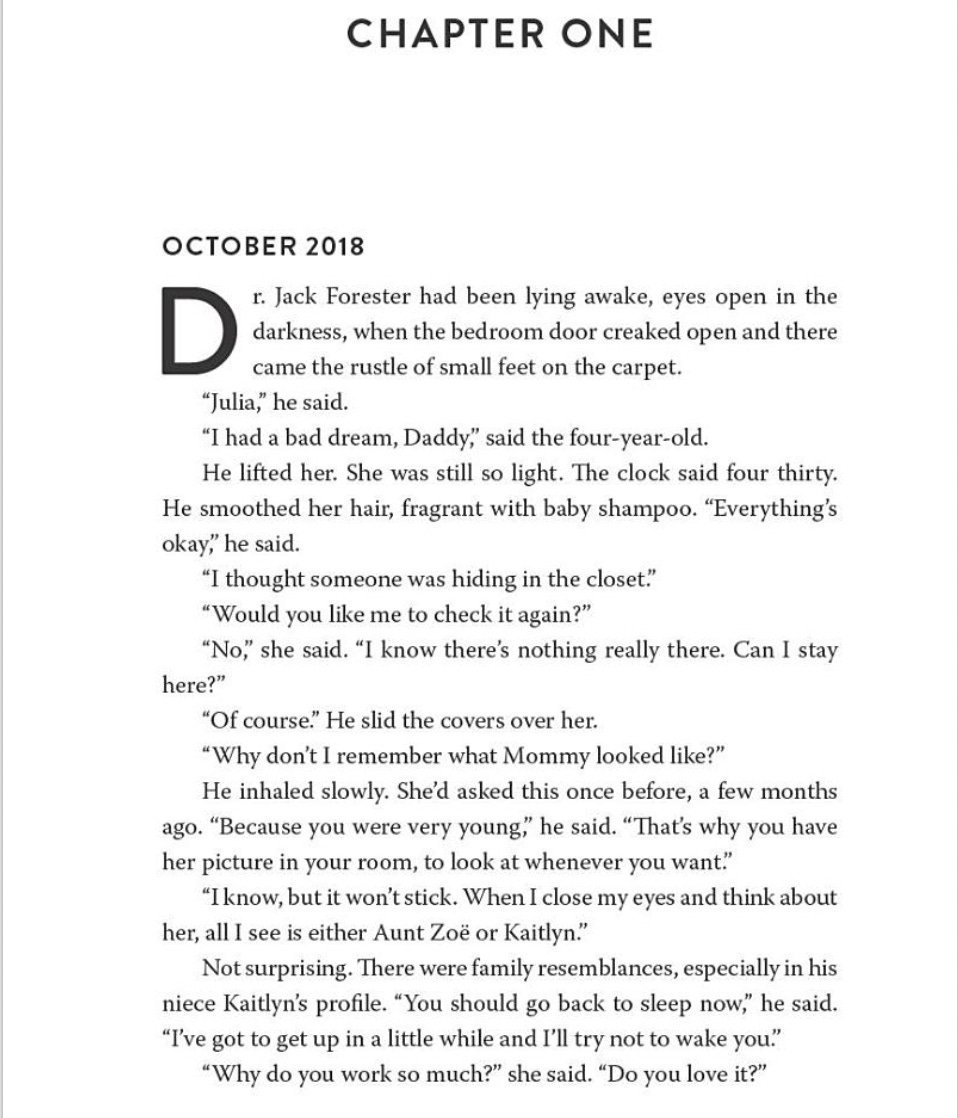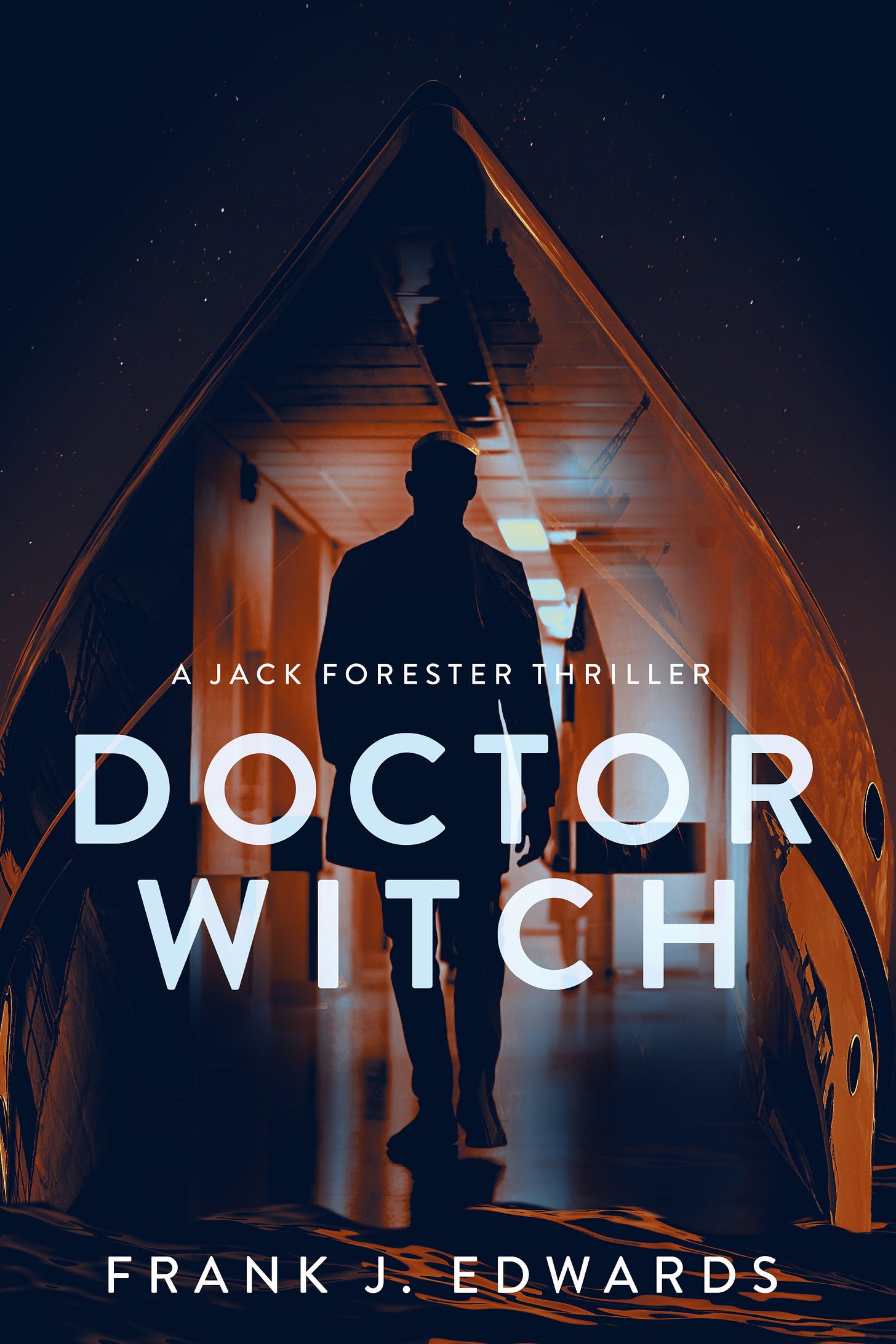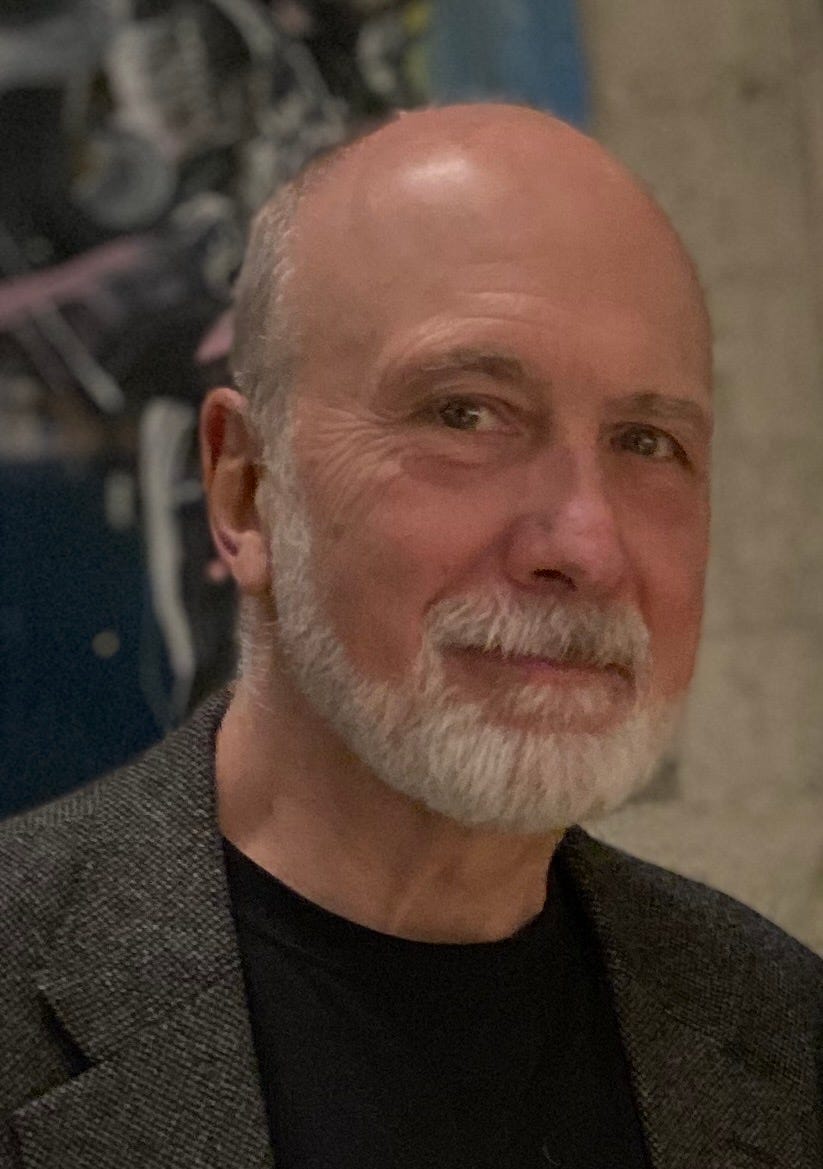After having published several books with independent, corporate, and university presses, the poet and novelist Frank J. Edwards decided to publish his newest novel, Doctor Witch: A Jack Forester Thriller, with Köehler Books, a hybrid press based in Virginia Beach.*
I’m a fan of Frank’s work and really enjoyed his new novel, of which you’ll find an excerpt at the end of this post, and I was curious about the factors that led to his decision. The hybrid model requires a financial investment from the author, and naturally, not all hybrid presses are created equal. My hunch was Frank had weighed his options carefully, and I wanted to learn more about his experience.
CS: You've gone a more traditional publication route with your previous books and weren’t required to cover any portion of your books' printing or marketing and sales costs. What spurred you to consider a hybrid press for your new novel, Doctor Witch?
FE: Good question. In the absence of landing an agent, one could go full indie and hire editors, cover artists, publicists, etc., but that’s a lot of work and it won’t be cheap. The greatest advantage of going hybrid is that your book passes through a selection process and receives editorial and design expertise similar to that of a traditional publisher. Hybrids give you an economy of scale access to these services. My editor at Köehler was as good as any I’ve encountered at traditional houses. The same goes for the cover and layout designers. I’m thrilled with the result.
Christine/Bookish: What attracted you to Köehler Books in particular?
Frank Edwards: The difference between vanity and hybrid publishing, of course, is that the former will take any manuscript accompanied by a sufficient fee and turn it into something resembling a book, with minimal or no refinement involved, and with the house having no stake whatsoever in the book’s success. Vanity presses print books, period.
On the other hand, a hybrid operation has all the internal trappings—editors, designers, publicists, and bookkeepers—of a commercial publisher. They vet submissions, develop and promote them, keep the accounts, and take a share of profits. Considering that most books do not make a return on investment, it doesn’t seem unfair or unethical for an author to help subsidize the process.
When I considered going hybrid with my new novel, Doctor Witch, I searched for houses that showed evidence of publishing quality work and found a number that fit the description. Having been brushed off by literary agents for many months, it was almost stunning when several hybrids promptly emailed me back wanting to talk. It was my turn to vet.
What was their editing and promoting processes? Their royalty arrangement? And how much would I have to shell out? Regarding cost, I was surprised by the range—from around $5,000 to more than $30,000. Going cheap, however, doesn’t necessarily equate to poor quality. The more you pay, the more copies you receive and, possibly, the more resources the house devotes to promotional efforts. The less you invest, the less chance they’ll place your book in a brick-and-mortar store. More on that in a minute.
I went with Köehler for several reasons. The interactions I had with the acquisition editor were excellent. He is a writer and seemed genuinely enthusiastic about my book. They accept only about 50% of the manuscripts they receive. The list of authors on their website and the testimonials were impressive.
I was highly swayed by the fact that Köehler also publishes agented works, and some of their output is published through a traditional format.
If your hybrid book sells more than 2,000 copies, Köehler offers an advance-bearing traditional contract for your next work. Köehler was on the lower end of the cost spectrum, as well. This was not only kinder to my budget but this made it feel like they had more skin in the game. I also Zoomed with John Köehler, the founder and owner. He’s a delightful guy and dedicated to the operation.
One downside to Köehler is that they have stopped placing books in brick-and-mortar stores because, I was told, they don’t want to eat the cost of accepting returns. I could live with that. The costliest of the hybrid houses I researched (north of $30,000) would indeed have put my novel on a shelf at Barnes and Noble, but the acquisitions editor treated me to a hard-sell pitch sprinkled with condescension. Bad vibe.
CS: I know it's early since your book was published just this past Tuesday, February 18, but do you see yourself publishing with the hybrid model again?
When my next book is ready, I will likely sprinkle fairy dust again and try to lure the interest of a good agent. But given the competitive, connection and dollar-driven state of the commercial publishing world right now, I won’t play the query game for very long and will happily return to the hybrid model.
CS: To play devil's advocate here, what do you see as potential downsides of publishing with a hybrid press? I.e. what do you suggest authors be mindful of before committing resources to this mode of publication?
FE: It goes without saying that research and trust are essential. Beyond the fact that you’ll be writing a check (I’m dating myself here), I see two downsides to hybrid publishing. One is that they won’t have the promotional muscle the big houses can flex. If you go hybrid, be prepared to roll up your sleeves big time after publication. But that’s okay.
The second “negative” involves the elusive issue of prestige. It’s the second-class citizen dilemma. Admitting that we paid someone to publish our work can bruise the ego. But it shouldn’t. The pipeline to traditional publishing nowadays is controlled by conglomerates and clogged with lots of meretricious stuff designed to turn a quick buck. Hybrid publishing will get your work out of the drawer and into the world where it belongs. I’m happy I did.
—
I’m sharing here an excerpt and the jacket copy of Doctor Witch:
Dr. Jack Forester has seen his share of trauma as an emergency physician. He's now the dean of a medical school and a single father still grieving the death of his wife. But the real abyss opens when a brilliant former colleague that Jack had flushed from cover as a psychotic serial killer a few years before conspires to destroy Jack and his hospital with the help of a cybercriminal. Jack is also faced with the need to somehow aid his beleaguered niece, Kaitlyn Anderson, a valiant teenager struggling to navigate a horrific home environment. Things grow even more perilous when Kaitlyn gets entangled in the villain's web.

—
Frank J. Edwards is a writer, emergency physician, and medical educator. He has published several other books, among them, Reap and Final Mercy, both medical thrillers (and his first two Jack Forester titles), The Problem with Zero, a poetry collection, and It'll Ease the Pain, stories and poems. His short stories and poems have appeared in literary journals including Virginia Quarterly Review. He has received Louisiana State University’s Eyster Prize in short fiction, and prior to college, he served as a U.S. Army helicopter pilot. After medical school, he earned an MFA in creative writing from Warren Wilson College.
*Frank was the subject of a Bookish interview last year too, which you can find here.





Well said, Dr. Edwards. I published my first novel with a hybrid company, Windy City Publishing, back in 2012. I went through the same process Dr. Edwards describes on my way to Windy City. The rejection from agents was overwhelming--I was trying to market a novel about a transgender woman well before the parade of celebrities came out as trans and made it (briefly) okay. The few responses I got were expressions of disgust.
My experience with Windy City Publishing was excellent. I worked with great editors and production people and learned more about the publishing business than I would have in a year or more at a university.
I have since published a number of novels with traditional publishers and I've enjoyed those relationships, but I have to say, the bigger the house, the more superficial the relationship has been for me.
As for Windy City, I've gone back to them to publish three anthologies I was involved in editing for Off Campus Writers Workshop. They were the perfect choice because OCWW had its own marketing engine, so our biggest need was for production, and outside editing services.
Thanks for covering this topic, Christine. I think the hybrids are often confused with vanity presses. You and Dr. Edwards make the distinction very clear.
Renee
I'm so glad you covered this topic. My experience working in corporate environments in other industries was exhausting enough. The thought of turning creative, personal work into another corporate machine is something I deeply dislike.
I'm looking forward to reading Doctor Witch, which has a cool cover design too.